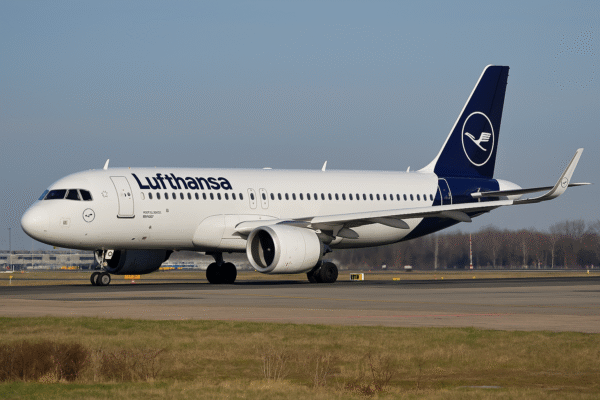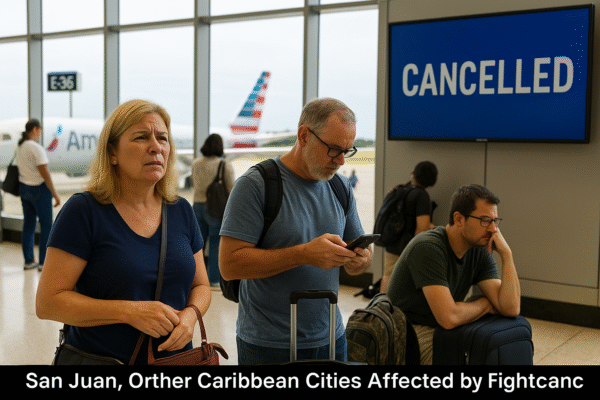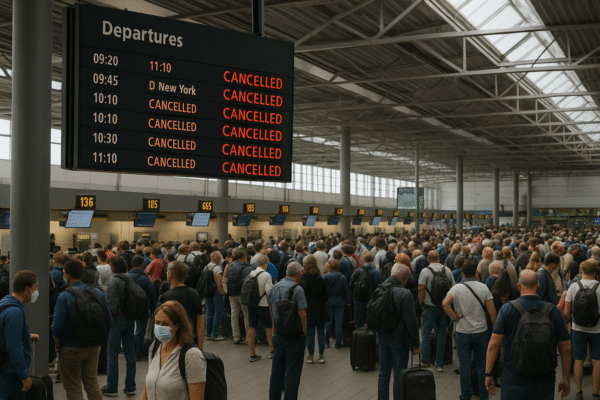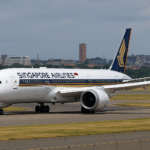A major cyberattack has paralyzed air travel across Europe, throwing some of the continent’s busiest airports into chaos. Critical airline systems used for check-in, boarding, and baggage handling crashed, forcing staff to revert to manual processes. The disruption led to thousands of delays and cancellations, affecting passengers in Berlin, London, Brussels, Dublin, and beyond.
Travelers across Europe were left stranded or forced into long queues as airline employees worked around the clock to manage passengers by hand. The incident highlights just how vulnerable global aviation is to sophisticated cyber threats, with a single attack capable of crippling multiple countries’ travel infrastructure.
Disrupted Airports and Widespread Passenger Delays
Berlin Brandenburg Airport was among the hardest hit, with long waits stretching well into the weekend. Staff urged travelers to arrive earlier than usual, with at least three hours recommended for international flights and two hours for short-haul journeys.
In London, Heathrow and other airports issued similar warnings, advising passengers to confirm flight details before leaving home. Although many flights still operated, the lack of automated systems led to confusion and missed departures.
Brussels Airport faced the most severe disruptions, canceling dozens of flights to relieve pressure on overwhelmed ground staff. Over the weekend alone, nearly 75 flights were scrapped, with further cancellations expected until systems are restored. Dublin Airport also experienced a ripple effect, with more than a dozen flights canceled in a single morning.
The problem extended beyond the affected hubs. Neighboring airports across Europe reported heavier passenger loads as rerouted travelers attempted to reach their destinations by alternative routes.
Grounded Flights and Broken Baggage Systems
The cyberattack not only halted check-in and boarding, it also created a delay in baggage handling systems. Without digital tracking tools, staff were forced to manually process luggage, leading to further delays and misplaced baggage reports. Many travelers complained of long waits at baggage claim areas, while others were forced to travel without their checked items.
For families and business travelers alike, the inconvenience has been immense. Vacations were interrupted, business meetings postponed, and travelers were left uncertain about when normal operations might resume.
Aviation Industry on High Alert
The scale of the disruption has raised urgent concerns across the aviation industry. Airlines and airports rely heavily on interconnected digital systems for operations, and this incident has demonstrated how fragile those systems can be when targeted by malicious actors.
Experts warn that cyberattacks on aviation infrastructure are becoming more common and increasingly sophisticated. A recent industry report revealed that ransomware and other digital attacks against airlines and airports have risen dramatically in the past year, with incidents up more than 600%.
Unlike typical technical malfunctions, cyberattacks pose broader risks because they can spread quickly across multiple networks, leaving entire regions vulnerable. The current crisis underscores the pressing need for stronger cybersecurity protections in global aviation.
Financial and Reputational Consequences
Beyond operational chaos, the financial impact of the cyberattack is likely to be enormous. Airlines face revenue losses from thousands of canceled flights, as well as additional costs for passenger accommodations, rebookings, and compensation claims.
Reputation is another casualty. Many passengers who faced hours of uncertainty and confusion are questioning the reliability of Europe’s largest airports and carriers. Building back trust will require not just technical fixes but also transparent communication and visible investments in cybersecurity.
The tourism industry is also bracing for the fallout. Europe, one of the world’s top travel destinations, relies heavily on seamless connectivity between major hubs. Prolonged disruptions could deter international visitors, especially during peak travel seasons, and harm local economies dependent on tourism.
The Human Side of the Crisis
For passengers caught in the turmoil, the experience has been exhausting. Families with children, elderly travelers, and those on tight schedules have struggled the most. Long lines, unclear announcements, and uncertainty about rebookings have turned what should be a routine journey into a stressful ordeal.
Social media has been flooded with images of crowded terminals and frustrated travelers. Some passengers reported sleeping overnight in airport lounges, while others sought alternative routes through rail or road transport.
Despite the challenges, many praised frontline staff who worked tirelessly to manage crowds under extraordinary pressure, even as systems remained offline.
Looking Ahead: Strengthening Aviation Cybersecurity
The incident is a wake-up call for global aviation. With technology forming the backbone of air travel, airports and airlines must strengthen defenses against cyberattacks. Governments, aviation authorities, and technology providers are expected to work together on new protocols, including:
- Investment in advanced cybersecurity systems to detect and neutralize threats quickly.
- Backup operational strategies that allow airports to continue functioning even when digital systems fail.
- International collaboration to share intelligence on cyber threats and strengthen global defenses.
Travel experts advise passengers to remain vigilant, keep updated on their flight status, and allow extra time at airports until systems are fully restored.
Conclusion
The cyberattack on European airports is more than just a temporary disruption—it is a stark reminder of the aviation sector’s growing dependence on vulnerable digital systems. With thousands of travelers stranded and tourism disrupted across the continent, the incident illustrates the urgent need for stronger cybersecurity in global aviation.
As Europe works to restore normal operations, the lessons learned from this crisis could shape the future of air travel security. For passengers and airlines alike, the priority now is resilience, ensuring that such a devastating disruption does not happen again.
For more travel news like this, keep reading Global Travel Wire


















